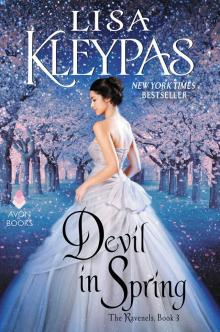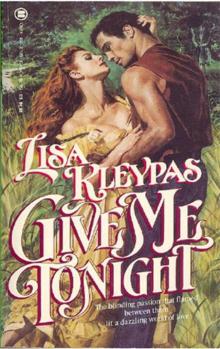- Home
- Lisa Kleypas
Brown-Eyed Girl Page 2
Brown-Eyed Girl Read online
Page 2
We reached the pavilion, where a trio of reps from the rental company were setting up white-painted chairs. Rummaging through my bag, I found a metal tape measure. With a few expert tugs, I extended it across the space between the cords that had been staked out to line up the chairs. “The aisle has to be six feet wide,” I called out to the reps. “Move the cord, please.”
“It is six feet,” one of them called back.
“It’s five feet and ten inches.”
The rep gave me a long-suffering glance. “Isn’t that close enough?”
“Six feet,” I insisted, and snapped the measuring tape closed.
“What do you do when you’re not working?” Joe asked from behind me.
I turned to face him. “I’m always working.”
“Always?” he asked skeptically.
“I’m sure I’ll slow down when the business is more established. But for now…” I shrugged. I could never seem to cram enough into one day. E-mails, phone calls, plans to be made, arrangements to nail down.
“Everyone needs some kind of hobby.”
“What’s yours?”
“Fishing, when I get the chance. Hunting, depending on the season. Every now and then I do some charity photography.”
“What kind of charity?”
“A local animal shelter. A good photo on the website can help a dog get adopted sooner.” Joe paused. “Maybe sometime you’d like to —”
“I’m sorry – excuse me.” I had heard a ringtone from somewhere in the abyss of my bag, repeating the five notes of “Here Comes the Bride.” As I retrieved the phone, I saw my sister’s ID.
“I’ve been calling the dove handler, and he won’t answer,” Sofia said as soon as I answered. “He never confirmed which container we wanted for the release.”
“Did you leave a message?” I asked.
“Five messages. What if something’s wrong? What if he’s sick?”
“He’s not sick,” I assured her.
“Maybe he got bird flu from his doves.”
“His birds aren’t doves. They’re white pigeons, and pigeons are resistant to bird flu.”
“Are you sure?”
“Try him again in a couple of hours,” I said soothingly. “It’s only seven. He may not even be awake yet.”
“What if he’s a no-show?”
“He’ll be here,” I said. “It’s too early in the day to freak out, Sofia.”
“When am I allowed to freak out?”
“You’re not,” I said. “I’m the only one who gets to do that. Let me know if you don’t hear from him by ten.”
“Okay.”
I slipped the phone back into my bag and gave Joe an inquiring glance. “You were saying something about the animal shelter?”
He stared down at me. His thumbs were hooked in his pockets, most of his weight braced on one leg, in a stance that was both assertive and relaxed. I had never seen anything sexier in my life.
“I could take you along with me,” he said, “next time I head over there. I wouldn’t mind sharing my hobby until you get one of your own.”
I was slow to respond. My thoughts had scattered like a flock of baby chicks at a petting zoo. I had the impression that he was asking me to go somewhere with him. Almost like… a date?
“Thanks,” I said eventually, “but my schedule is full.”
“Let me take you out sometime,” he urged. “We could go out for drinks, or lunch.”
I was rarely at a loss for words, but all I could do was stand there in baffled silence.
“Tell you what.” His voice turned coaxing and soft. “I’ll drive you to Fredericksburg one morning, while the day is still cool and we have the road to ourselves. We’ll stop to buy some coffee and a bag of kolaches. I’ll take you to a meadow so full of bluebonnets, you’ll swear half the sky just fell over Texas. We’ll find us a shade tree and watch the sunrise. How does that sound?”
It sounded like the kind of day meant for some other woman, someone who was accustomed to being charmed by handsome men. For a second I let myself imagine it, lounging with him on a quiet morning in a blue meadow. I was on the verge of agreeing to anything he asked. But I couldn’t afford to take such a risk. Not now, not ever. A man like Joe Travis had undoubtedly broken so many hearts that mine would mean nothing to him.
“I’m not available,” I blurted out.
“You’re married?”
“No.”
“Engaged?”
“No.”
“Living with someone?”
I shook my head.
Joe was quiet for a few seconds, staring at me as if I were a puzzle he wanted to solve. “I’ll see you later,” he said eventually. “And in the meantime… I’m going to figure out how to get a ‘yes’ out of you.”
Two
F
eeling somewhat dazed after the encounter with Joe Travis, I went to the main house and found my sister in the office. Sofia was beautiful and dark-haired, her eyes a rich hazel green. She had a curvy figure like me, but she dressed with flair, having no reservations about flaunting her hourglass shape.
“The dove handler just called back,” Sofia said triumphantly. “The birds are confirmed.” She gave me a concerned glance. “Your face is red. Are you dehydrated?” She handed me a bottle of water. “Here.”
“I just met someone,” I said after a few gulps.
“Who? What happened?”
Sofia and I were half-sisters who had been raised apart. She had lived with her mother in San Antonio, while I had lived with mine in Dallas. Although I had been aware of Sofia’s existence, I hadn’t met her until we were both grown. The Crosslin family tree had a few too many branches, thanks to our father Eli’s five failed marriages and prolific affairs.
Eli, a handsome man with golden hair and a blinding smile, had pursued women compulsively. He had loved the emotional and sexual high of conquest. Once the excitement had faded, however, he’d never been able to settle into everyday life with one woman. For that matter, he’d never stayed with one job for more than a year or two.
There had been other children besides Sofia and me, half-siblings and innumerable stepsiblings. All of us had been abandoned by Eli, in turn. After the occasional call or visit, he would disappear for long periods, sometimes a couple of years. And then he would reappear briefly, magnetic and exciting, full of interesting stories and promises that I knew better than to believe.
The first time I met Sofia had been right after Eli had suffered a major stroke, an unexpected event for a man of his age and good physical condition. I had flown down from New York City to find an unfamiliar young woman waiting in his hospital room. Before she had even introduced herself, I had known she was one of Eli’s daughters. Although her coloring – black hair, glowing amber skin – had come from her Hispanic mother’s side of the family, her fine, sculpted features had unmistakably been inherited from our father.
She had given me a cautious but friendly smile. “I’m Sofia.”
“Avery.” I had reached out for an awkward handshake, but she’d moved forward to hug me instead, and I’d found myself reciprocating and thinking, My sister, with a thrill of connection I wouldn’t have expected. I had looked over her shoulder at Eli in the hospital bed, hooked up to machines, and I hadn’t been able to make myself let go. That had been fine with Sofia, who was never the first to end a hug.
In the vast accumulation of Eli’s offspring and exes, Sofia and I were the only ones who had shown up. I didn’t blame any of the others for that: I hadn’t even been sure why I was there. Eli had never read me a bedtime story, or bandaged a skinned knee, or done any of the things fathers were supposed to do. In his self-absorption, there had been no attention to spare for his children. Moreover, the pain and fury of the women he’d abandoned had made it difficult to contact their children, even if he’d wanted to. Eli’s usual method of ending a relationship or a marriage was to have an exit affair, cheating until he was caught and kicked out. My
mother had never forgiven him for that.
But Mom had repeated the same pattern, taking up with cheaters, liars, deadbeats, men who wore their red flags on their sleeves. Among the tumult of affairs, she had married and divorced two more times. Love had brought her so little happiness, it was a wonder that she kept searching for it.
In my mother’s mind, the blame lay entirely with my father, the man who had started her on the self-defeating path. As I became older, however, I wondered if the reason Mom hated Eli so much was that they were so similar. I found no small irony in the fact that she was a temp secretary, going from office to office, boss to boss. When she had been offered a permanent position at one of the companies, she had refused. It would become too monotonous, she’d said, doing the same thing every day, always seeing the same people. I had been sixteen at the time, too mouthy to resist pointing out that with that attitude, she probably wouldn’t have stayed married to Eli anyway. That had provoked an argument that had nearly resulted in me getting kicked out of the house. Mom had been so infuriated by my comment that I knew I was right.
From what I’d observed, the kind of love that flared brightest also burned out the fastest. It couldn’t survive after the novelty and excitement had worn off and it was time to match socks from the dryer, or vacuum the dog hair off the sofa, or organize household debris. I wanted nothing to do with that kind of love: I couldn’t see the benefit. Like the slam and fade of a destructive drug, the high never lasted long enough, and the low left you empty and craving more.
As for my father, every woman he’d supposedly loved, even the ones he’d married, had been nothing more than a stop along the way to someone else. He had been a single traveler on his life’s journey, and that was how it had ended. The office manager of Eli’s apartment complex had found him unconscious on the floor of his living room, after he’d failed to show up to renew his lease.
Eli had been rushed to the hospital in an ambulance, but he had never regained consciousness.
“My mother’s not coming,” I had told Sofia as we sat together in the hospital room.
“Mine either.”
We had glanced at each other in mutual understanding. Neither of us had to ask why no one else had come to say good-bye. When a man abandoned his family, the hurt of it kept bringing out the worst in them long after he’d gone.
“Why are you here?” I dared to ask.
While Sofia considered her answer, the silence was punctured by the beeps from a monitor and the ventilator’s constant rhythmic whoosh. “My family is Mexican,” she finally said. “To them, everything is about togetherness and tradition. I always wanted to belong, but I knew I was different. My cousins all had fathers, while mine was a mystery. Mamá would never talk about him.” Her gaze went to the bed where our father lay enmeshed inside a tangle of tubes and wires that hydrated, fed, breathed, regulated, and drained. “I only saw him once, when I was a little girl and he came to visit. Mamá wouldn’t let him talk to me, but I ran after him when he walked out to his car. He was holding some balloons he’d brought for me.” She smiled absently. “I thought he was the handsomest man in the world. He tied the ribbons around my wrist so the balloons wouldn’t float away. After he drove off, I tried to bring the balloons into the house, but Mamá said I had to get rid of them. So I untied the ribbons and let them go, and I made a wish as I watched them float away.”
“You wished that you would see him again someday,” I said quietly.
Sofia nodded. “That’s why I came. What about you?”
“Because I thought no one else would be here. And if someone had to take care of Eli, I didn’t want it to be a total stranger.”
Sofia’s hand had covered mine, as naturally as if we’d known each other all our lives. “Now it’s the two of us,” she’d said simply.
Eli had passed away the next day. But in the process of losing him, Sofia and I had found each other.
At the time I had been working in bridal couture, but my career had been going nowhere. Sofia had been working as a nanny in San Antonio, planning children’s parties on the side. We had talked about starting a wedding-planning studio together. Now, a little more than three years later, our Houston-based business was working out better than we had even dared to hope. Each small success had built on the next, allowing us to hire three employees and an intern. With the Kendrick wedding, we were on the verge of a breakthrough.
As long as we didn’t screw up.
“Why didn’t you say yes?” Sofia demanded after I told her about meeting Joe Travis.
“Because I don’t believe for one minute that he was actually interested in me.” I paused. “Oh, don’t give me that look. You know that type of guy goes for trophy women.”
I had been voluptuous since adolescence. I walked everywhere, took the stairs whenever possible, and went to a dance class twice a week. I ate healthy food and routinely consumed enough salad to choke a manatee. But no amount of exercise and or dieting would ever shrink me down to a single-digit dress size. Sofia often urged me to buy more body-conscious clothes, and I always told her I would do it later, when I was the right size.
“You’re the right size now,” Sofia would reply.
I knew that I shouldn’t let a bathroom scale stand between me and happiness. Some days I won, but more often than not, the scale won.
“My grandmother always says, ‘Sólo las ollas saben los hervores de su caldo.’”
“Something about soup?” I guessed. Whenever Sofia related some of her grandmother’s wisdom, it usually took the form of food analogies.
“Only pots know the boilings of their broths,” Sofia said. “Maybe Joe Travis is the kind who loves a woman with a real figure. The men I knew in San Antonio always went for the women with big pompis.” She patted her rear end for emphasis and went to her laptop.
“What are you doing?” I asked.
“Googling him.”
“Right now?”
“It will only take a minute.”
“You don’t have a minute – you’re supposed to be working!”
Ignoring me, Sofia kept pecking at the keyboard, two-finger style.
“I don’t care what you find out about him,” I said. “Because I happen to be busy with this thing we’ve got scheduled… What was it?… Oh, yes, a wedding.”
“He’s hot,” Sofia said, staring at her monitor. “And so is his brother.”
She had clicked on a Houston Chronicle article headed with a photo of three men, all dressed in beautifully tailored suits. One of them was Joe, much younger and lankier than he’d been today. He must have packed on at least thirty pounds of muscle since the photo had been taken. A caption beneath the picture identified the other two as Joe’s brother Jack and his father, Churchill. Both sons were a head taller than their sire, but they bore his stamp – the dark hair and intense eyes, the pronounced jawlines.
I frowned as I read the accompanying article.
HOUSTON, Texas (AP) In the aftermath of an explosion on their private boat, two sons of Houston businessman Churchill Travis tread water among fiery debris for approximately four hours as they waited for rescue. After a massive search effort by the Coast Guard, the brothers, Jack and Joseph, were located in Gulf waters off Galveston. Joseph Travis was airlifted directly to the level one trauma unit at Garner Hospital for immediate surgery. According to a hospital spokesman, his condition has been listed as critical but stable. Although details of the surgery have not been released, a source close to the family confirmed that Travis was suffering from internal bleeding as well as —
“Wait,” I protested as Sofia clicked on another link. “I was still reading.”
“I thought you weren’t interested,” she said impishly. “Here, look at this.” She found a Web page labeled “Houston’s Top Ten Eligible Bachelors.” The article featured a candid shot of Joe playing football on the beach with friends, his body sleek and hard-looking, muscular without being muscle-bound. The expanse of dark hair on his chest
narrowed to a dark line that led to the waistband of his board shorts. It was a picture of unself-conscious masculinity, off-the-charts hot.
“Six foot one,” Sofia said, reading his stats. “Twenty-nine years old. Graduate of UT. A Leo. Photographer.”
“Cliché,” I said dismissively.
“Being a photographer is a cliché?”
“Not for an ordinary guy. But for a trust fund baby, it’s a total vanity job.”
“Who cares? Let’s see if he has a website.”
“Sofia, it’s time to stop fangirling over this guy and get some work done.”
A new voice entered the conversation as my assistant, Steven Cavanaugh, walked into the office. He was a good-looking man in his mid-twenties, blue-eyed and blond and lean. “Fangirling over who?” he asked.

 Devil in Spring
Devil in Spring Sugar Daddy
Sugar Daddy Devil in Winter
Devil in Winter Dreaming of You
Dreaming of You Christmas Eve at Friday Harbor
Christmas Eve at Friday Harbor Love, Come to Me
Love, Come to Me Only With Your Love
Only With Your Love Suddenly You
Suddenly You Secrets of a Summer Night
Secrets of a Summer Night Cold-Hearted Rake
Cold-Hearted Rake Where's My Hero?
Where's My Hero? Gifts of Love
Gifts of Love Married by Morning
Married by Morning Then Came You
Then Came You Wish List
Wish List Where Dreams Begin
Where Dreams Begin A Historical Christmas Present
A Historical Christmas Present Somewhere I'll Find You
Somewhere I'll Find You Scandal in Spring
Scandal in Spring Someone to Watch Over Me
Someone to Watch Over Me Worth Any Price
Worth Any Price Prince of Dreams
Prince of Dreams It Happened One Autumn
It Happened One Autumn Love in the Afternoon
Love in the Afternoon Devil's Daughter
Devil's Daughter A Wallflower Christmas
A Wallflower Christmas Tempt Me at Twilight
Tempt Me at Twilight Brown-Eyed Girl
Brown-Eyed Girl Mine Till Midnight
Mine Till Midnight Again the Magic
Again the Magic Lady Sophia's Lover
Lady Sophia's Lover Because You're Mine
Because You're Mine Midnight Angel
Midnight Angel Smooth-Talking Stranger
Smooth-Talking Stranger Blue-Eyed Devil
Blue-Eyed Devil Hello Stranger
Hello Stranger Dream Lake
Dream Lake Devil's Daughter: The Ravenels Meet the Wallflowers
Devil's Daughter: The Ravenels Meet the Wallflowers A Christmas to Remember
A Christmas to Remember Smooth Talking Stranger
Smooth Talking Stranger Crystal Cove
Crystal Cove Marrying Winterborne
Marrying Winterborne Stranger in My Arms
Stranger in My Arms Devil in Disguise
Devil in Disguise Worth Any Price bsr-3
Worth Any Price bsr-3 Give Me Tonight
Give Me Tonight Rainshadow Road fh-2
Rainshadow Road fh-2 Seduce Me At Sunrise
Seduce Me At Sunrise I Will
I Will Someone to Watch Over Me bsr-1
Someone to Watch Over Me bsr-1 Lady Sophias Lover bsr-2
Lady Sophias Lover bsr-2 A Hathaway Wedding
A Hathaway Wedding A Hathaway Wedding (Hathaways Bk2.5)
A Hathaway Wedding (Hathaways Bk2.5) Worth Any Price - Bow Street 3
Worth Any Price - Bow Street 3 Christmas with Holly
Christmas with Holly